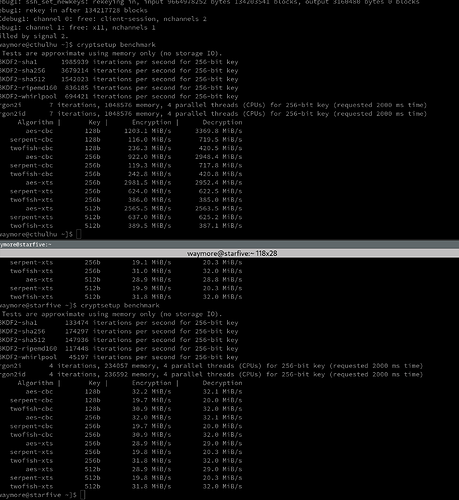Hello,
According to the datasheet:
“ Secure System
Embedded two cipher engine
Support Link List Item (LLI) DMA transfer
Support SHA-1, SHA-256/224, SHA-512/384, MD5, SM3 with hardware padding
Support HMAC of SHA-1, SHA-256, SHA-512, MD5, SM3 with hardware padding
Support AES-128, AES-192, AES-256 encrypt & decrypt cipher
Support AES ECB/CBC/OFB/CFB/CTR/CTS/XTS/CCM/GCM/CBC-MAC/CMAC
mode
RK3588 Datasheet Rev 0.1
Copyright 2021 ©Rockchip Electronics Co., Ltd. 10
Support SM4 ECB/CBC/OFB/CFB/CTR/CTS/XTS/CCM/GCM/CBC-MAC/CMAC
mode
Support DES & TDES cipher, with ECB/CBC/OFB/CFB mode
Support up to 4096 bits PKA mathematical operations for RSA/ECC/SM2
Support generating random numbers”
But when I run a cryptsetup benchmark, and bear in mind this is running a RAM test only, no IO to storage, I get this:
The top is my pc, the bottom the Rock 5. I would expect such poor performance only if there was absolutely no acceleration and the algo was run on software mode. Has anyone gotten it to work?
I’m not sure if the terrible performance so far is only due to software implementations, or the datasheet is complete rubbish and it just lists everything the cpu CAN do rather than actual instructions (ala AVX, etc).
